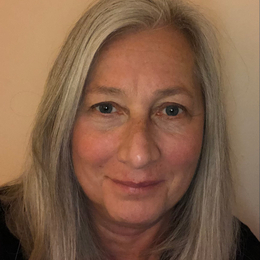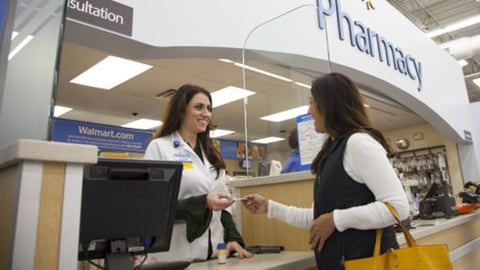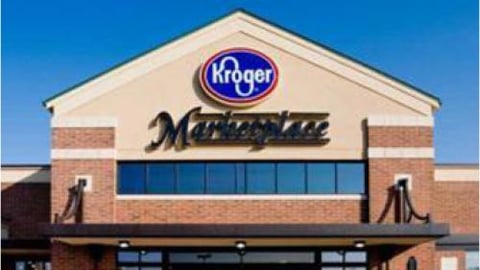Top Grocers Take Aim Against Opioid Epidemic
The United States is facing an unprecedented opioid epidemic that has become a public health emergency. The U.S. Department of Health and Human Services estimates that 2.1 million people in this country struggle with an opioid-use disorder, while 116 people die from opioid-related drug overdoses every day, according to the Health Resources and Services Administration.
This widespread issue demands grass-roots community action, and grocery chains are stepping up their efforts to involve their pharmacists in the fight against opioid abuse through programs to educate consumers, methods to control access to unused opioids, and making available drugs that can combat overdoses.
“As trusted health care professionals, pharmacists are uniquely positioned to engage their patients on this critical issue,” says John Parker, SVP of communications for the Arlington, Va.-based Healthcare Distribution Alliance, a national organization representing primary pharmaceutical distributors. “Allied Against Opioid Abuse (AAOA) commissioned a poll that showed many patients do not know about prescription opioid safety, but would like to learn more from their pharmacist. We are working with our pharmacy partners to make sure pharmacists have tools and resources to educate their patients about the rights, risks and responsibilities associated with these pain medications.”
- Key Takeaways
- As trusted health care professionals, pharmacists – including those at supermarkets – are uniquely positioned to engage their patients on the critical issue of opioid abuse.
- Many supermarket pharmacists are undergoing training to enable them to answer consumers’ questions about opioids and provide counseling.
- Grocers’ programs include educating schoolchildren; takeback programs to collect unused drugs, many in partnership with the DEA or local law enforcement authorities; systems that allow for safe disposal of medications at home; and making naloxone, which can reverse opioid overdoses, easily available.
Launched in February 2018, AAOA created the AAOA Pharmacy Toolkit to help pharmacists navigate difficult but important conversations to help prevent opioid abuse and misuse.
“More than 9 million customers visit our family of stores every day, providing us the opportunity to influence and educate about the opioid epidemic and how we can partner to solve the epidemic,” notes Colleen Lindholz, president of Kroger Health for the Cincinnati-based Kroger Co., No. 2 on Progressive Grocer's list of the top grocers in the United States and the retail intelligence brand's 2018 Retailer of the Year. “In 2019, we are requiring our pharmacists to take 3-plus hours of opioid education, ranging in topic from helping patients with addictions, to reviewing acute and chronic pain management guidelines, to pathways on safer opioid use. Additionally, pharmacy technicians will also be required to participate in select opioid education programs.”
Kroger partnered with Washington, D.C.-based education technology company EverFi in 2018 to provide a computer-based program available to high school students in nine cities. Aligned with the Centers for Disease Control and Prevention’s national health education standards and state academic standards, the program teaches students how to properly read a prescription drug label, as well as communicating the dangers of misusing prescription medications. “In the 2018-19 school year, we expect more than 13,500 students to receive this training,” says Lindholz.
Albertsons Cos., No. 3 on Progressive Grocer's list of the top grocers in the United States, is educating students as well, with a program targeted to middle schoolers. “We’re most proud of our outreach efforts to educate middle school children on medication safety and smart medication use,” says Mark Panzer, SVP, pharmacy health and wellness at Boise, Idaho-based Albertsons. “Our pharmacy residents and pharmacists presented information to students on the benefits and risks associated with medication use; misuse; impacts of misuse; identifying opioids; commonly used products and ‘slang’ terminology; current trends and dangers associated with opioid misuse; how to safely use medications, specifically opioids; the signs of an opioid overdose; steps to take if an overdose is suspected; and the importance of talking with a pharmacist about medication-use questions.”
Takeback Services Expand
Unused and expired medications that remain in homes can pose significant public health and safety concerns, due to their high susceptibility to diversion, misuse and abuse. Studies show that more than half of all people who first misuse prescription drugs get them from their friends or relatives, or take them without asking.
Takeback services can play an important part in giving patients the opportunity to securely dispose of potentially dangerous expired, unused and unwanted prescription drugs, and may help limit the misuse of such drugs.
“Removing unused medication from patient’s homes is a key to solving the opioid epidemic,” asserts Lindholz. “According to the 2016 National Survey on Drug Use and Health, 53 percent of respondents obtained the last opioid they misused from a friend or relative.”
In April 2018, Kroger hosted 107 drug takeback events and collected more than 17,500 pounds of unused prescription drugs, and this past October, the chain hosted 203 drug takeback events, during which it collected about 24,000 pounds of unused prescription drugs. According to Lindholz, the company will continue its efforts in 2019.
“The opioid epidemic is a serious public health issue, one that requires action and efforts by everyone,” says Leigh Shirley, RPh, director of pharmacy for Carlisle, Pa.-based Giant Food Stores. “As a community health care provider, we’re committed to doing our part to help address drug abuse and misuse. Participating in drug takeback events with the DEA and local law enforcement agencies is one way we are able to help combat the opioid epidemic in the communities we serve. Our pharmacists are also able to direct patients to other drug disposal sites throughout the year and answer questions they may have about … other topics related to the opioid crisis.”
For its part, Albertsons offers patients medication takeback counseling services year-round in all of its pharmacies. To further promote this service, the chain participates with the DEA’s National Prescription Take Back program and teams with Consumer Reports for National Check Your Meds Day. “By offering and promoting this service, our pharmacists not only follow through with their commitment to taking care of their patients, but they increase the pharmacist-patient trust and their accessibility as a health care provider in the community,” says Panzer. “We also offer patients home medication disposal instructions created by the FDA for the specific drugs that can be safely disposed of at home.”
Albertsons’ takeback service also includes pharmacist counseling on doses that are too high, the possibility of adverse interactions, whether taking some medicines are worth reconsidering – some drugs are taken to control side effects of other drugs, when a lifestyle change might work better or just as well – and recommendations about what to discuss with a patient’s doctor, such as lowering a dose or stopping a medication.
Rochester, N.Y.-based Wegmans Food Markets, No. 14 on Progressive Grocer's list of the top grocers in the United States, has partnered with local law enforcement agencies across its six-state footprint to host community prescription medication drop-off events. Meanwhile, South Bend, Ind.-based Martin’s Super Markets has joined forces with the 525 Foundation, an organization in the grocer’s hometown dedicated to bringing awareness to dangers of prescription drug abuse, to place secure drop boxes for expired or unneeded medication at three of its locations.
Safe Disposal at Home
In addition to takeback events, supermarkets are giving consumers the option of using systems at home that render their leftover prescription medications inactive. Sanford, N.C.-based DisposeRx offers a solution containing ingredients that, when emptied into a pill bottle with warm water, enable patients to responsibly dispose of leftover medications in their trash, according to the manufacturer.
At Bentonville, Ark.-based Walmart, No. 1 on Progressive Grocer's list of the top grocers in the United States, patients filling any new Class II opioid prescription receive a free DisposeRx packet and an opioid safety information brochure when they pick up their prescription. Patients with chronic Class II opioid prescriptions are offered a free DisposeRx packet every six months. Kroger also offers its customers DisposeRX, providing a free packet with certain acute-care opioid prescriptions.
Big Y Pharmacy and Wellness Centers, operated by Springfield, Mass.-based Big Y Supermarkets, have adopted the Deterra Drug Deactivation System, offering consumers the in-home drug disposal system to permanently deactivate unused drugs.
Combating Opioid Overdoses With Naloxone
More supermarket pharmacies are stocking naloxone, a lifesaving medication that can reverse the effects of an opioid overdose. The drug, which can be administered as a nasal spray or an injection, must be given while also calling 911 for medical assistance.
“We know the availability of this medication has the potential to save lives,” says Kristin Williams, SVP and chief health officer for West Des Moines, Iowa-based Hy-Vee, No. 15 on Progressive Grocer's list of the top grocers in the United States. “It’s vital to do everything we can to assist a loved one who may encounter an opioid overdose by combining medications or by accidentally taking too much of a medication, being unaware of the life-threatening results.”
Hy-Vee offers naloxone without a prescription in the eight states where it operates pharmacies: Illinois, Iowa, Kansas, Minnesota, Missouri, Nebraska, South Dakota and Wisconsin.
Kroger offers offer naloxone in each of the company’s nearly 2,200 pharmacies, dispensing the medication without a prescription where allowable by state law. “From the beginning of [2018] to mid-October, our pharmacies dispensed nearly 14,000 doses of naloxone — each dose may have saved a life,” notes Lindholz.
All of Giant/Martin’s 138 pharmacies and all Big Y locations also provide naloxone, and pharmacists at those chains dispense the drug without a prescription where allowed. “All pharmacists have received broad training on naloxone, covering topics like the proper use of various products, the various forms available, ways to identify patients most at risk for an accidental overdose based on their prescriptions and other risk factors, and more,” explains Giant’s Shirley.
More than 1,600 Albertsons pharmacies across 21 states carry Narcan, an FDA-approved naloxone nasal spray. “We’ve specially trained over 4,000 pharmacists to administer the FDA-approved Narcan nasal spray and counsel patients on the treatment of this medication,” says Panzer. Training includes how to counsel patients on the availability and appropriateness of naloxone therapy, how to privately consult with a patient or caregiver to determine eligibility for Narcan, how to use the product, and what to watch for after use."







